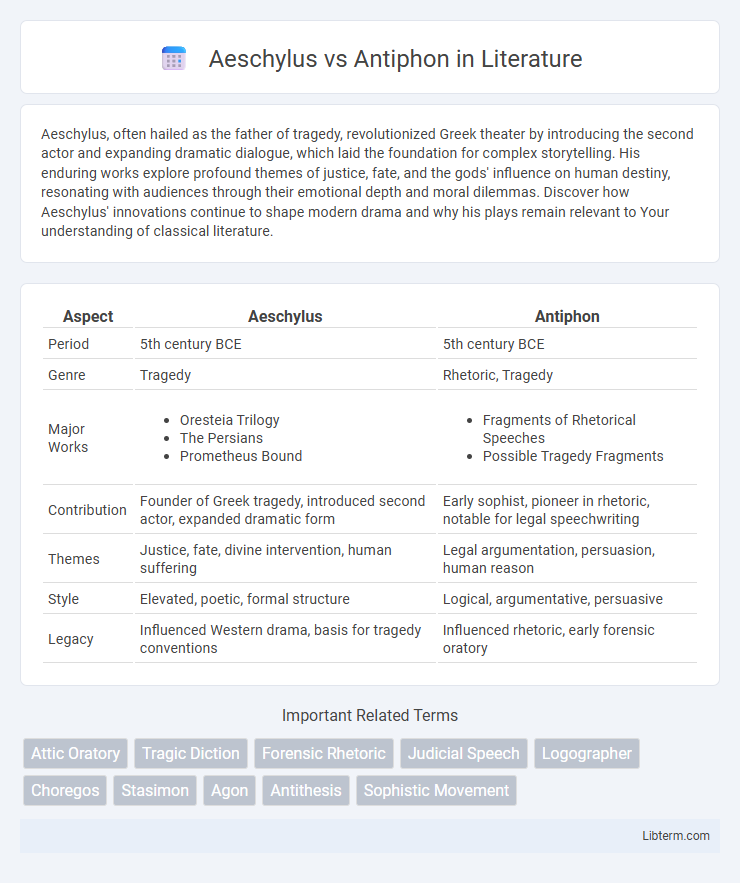Aeschylus, often hailed as the father of tragedy, revolutionized Greek theater by introducing the second actor and expanding dramatic dialogue, which laid the foundation for complex storytelling. His enduring works explore profound themes of justice, fate, and the gods' influence on human destiny, resonating with audiences through their emotional depth and moral dilemmas. Discover how Aeschylus' innovations continue to shape modern drama and why his plays remain relevant to Your understanding of classical literature.
Table of Comparison
| Aspect | Aeschylus | Antiphon |
|---|---|---|
| Period | 5th century BCE | 5th century BCE |
| Genre | Tragedy | Rhetoric, Tragedy |
| Major Works |
|
|
| Contribution | Founder of Greek tragedy, introduced second actor, expanded dramatic form | Early sophist, pioneer in rhetoric, notable for legal speechwriting |
| Themes | Justice, fate, divine intervention, human suffering | Legal argumentation, persuasion, human reason |
| Style | Elevated, poetic, formal structure | Logical, argumentative, persuasive |
| Legacy | Influenced Western drama, basis for tragedy conventions | Influenced rhetoric, early forensic oratory |
Introduction: Comparing Aeschylus and Antiphon
Aeschylus, often regarded as the father of Greek tragedy, introduced innovative dramatic structures and profound themes that shaped classical literature, while Antiphon, a pioneering sophist and orator, emphasized rhetorical skill and legal argumentation in classical Athens. Aeschylus's works, such as "The Oresteia," explore divine justice and human morality, contrasting with Antiphon's forensic speeches focused on persuasion and civic matters. This comparison highlights their distinct contributions to Greek intellectual and cultural history--Aeschylus in drama and Antiphon in rhetoric.
Historical Backgrounds of Aeschylus and Antiphon
Aeschylus, often hailed as the father of Greek tragedy, lived during the 5th century BCE and participated in the Persian Wars, which influenced his epic and religious-themed plays. Antiphon, a contemporary Sophist and logographer from Athens, contributed to the development of rhetorical and legal discourse around the same period. Both figures shaped classical Greek literature, with Aeschylus emphasizing dramatic storytelling and Antiphon advancing forensic oratory.
Literary vs. Rhetorical Contributions
Aeschylus revolutionized Greek tragedy by introducing complex characters and themes, laying the foundation for Western drama with his poetic and dramatic innovations. Antiphon, a pioneer of rhetorical theory, significantly influenced forensic oratory through his analytical approach to speech construction and persuasive techniques. While Aeschylus shaped literary tradition with narrative depth and mythic exploration, Antiphon's contributions advanced the formal study and practice of rhetoric in classical Athens.
Philosophical Themes in Their Works
Aeschylus explores profound themes of justice, fate, and divine intervention, emphasizing moral responsibility and the consequences of human actions within a cosmic order. Antiphon's works engage with natural law, fatalism, and the conflict between human reason and societal norms, questioning traditional beliefs through a rational and critical lens. Both playwrights address the tension between individual agency and external forces, yet Aeschylus frames it within mythological contexts while Antiphon adopts a more philosophical and argumentative approach.
Approaches to Justice and Morality
Aeschylus emphasizes divine justice and moral order governed by gods, portraying justice as an immutable cosmic principle beyond human control. Antiphon advocates for natural law and human reason, suggesting justice stems from social contracts and self-interest rather than divine decree. Their contrasting approaches highlight the tension between fate-driven morality and rational jurisprudence in ancient Greek thought.
Stylistic Differences in Expression
Aeschylus' expression in tragedy is characterized by elevated, formal language rich in imagery and metaphor, reflecting profound themes of fate and divine justice. Antiphon's rhetorical style, in contrast, employs straightforward, persuasive prose grounded in logical argumentation and clarity, suited for forensic and political contexts. The stark difference highlights Aeschylus' poetic grandeur versus Antiphon's pragmatic oratory tailored to legal persuasion.
Influence on Classical Greek Culture
Aeschylus significantly shaped Classical Greek culture by pioneering tragedy, deeply exploring themes of justice and divine order impacting Greek drama and religious thought. Antiphon influenced the development of rhetoric and legal argumentation, introducing forensic oratory techniques that advanced Athenian law courts and democratic engagement. Their contributions collectively enhanced Greek cultural identity by intertwining theatrical innovation with evolving public discourse.
Reception and Legacy in Later Periods
Aeschylus, often regarded as the father of Greek tragedy, profoundly influenced the development of dramatic literature with his innovative use of dialogue and chorus, securing a lasting legacy in Western theatrical tradition. In contrast, Antiphon, known for his skill in rhetoric and as a pioneer of early Greek oratory, had a significant impact on the evolution of forensic and deliberative rhetoric but left fewer dramatic works, resulting in a more specialized reception. Later periods celebrated Aeschylus for his grand themes and mythological depth, while Antiphon's contributions remained crucial within the fields of rhetoric and philosophy, shaping classical education and legal argumentation.
Key Works and Surviving Texts
Aeschylus is renowned for his trilogy "Oresteia," which includes "Agamemnon," "The Libation Bearers," and "The Eumenides," representing some of the earliest and most complete works of Greek tragedy. Antiphon, primarily known as a sophist and logographer, has only fragments of his rhetorical speeches and philosophical works surviving, lacking complete plays or extensive texts. The preservation of Aeschylus' complete tragedies provides invaluable insight into classical Greek drama, whereas Antiphon's limited surviving texts highlight his influence in early legal and philosophical thought rather than theatrical literature.
Lasting Impact on Drama and Oratory
Aeschylus revolutionized Greek drama by introducing the second actor, thus shaping the structural foundation of Western theater and influencing narrative complexity in tragedy. Antiphon, as a pioneer of rhetoric, advanced forensic oratory by systematizing persuasive techniques and laying groundwork for courtroom advocacy in ancient Athens. The lasting impact of Aeschylus endures in dramatic literature and performance, while Antiphon's contributions persist in the principles of legal argumentation and rhetorical education.
Aeschylus Infographic

 libterm.com
libterm.com